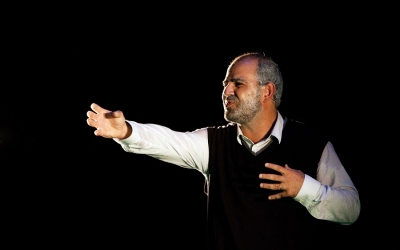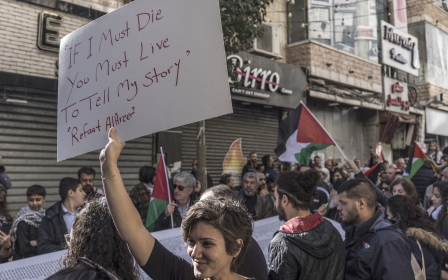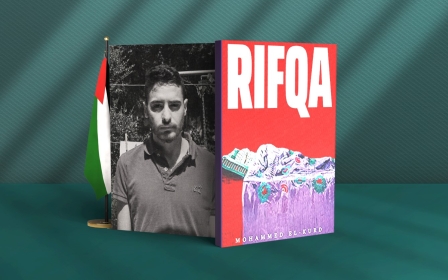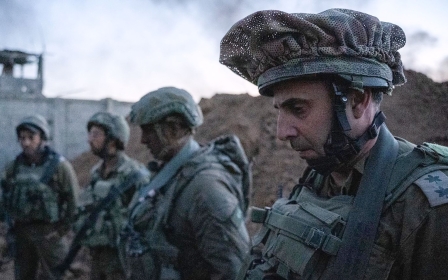War on Gaza: How to embrace Palestine through poetry
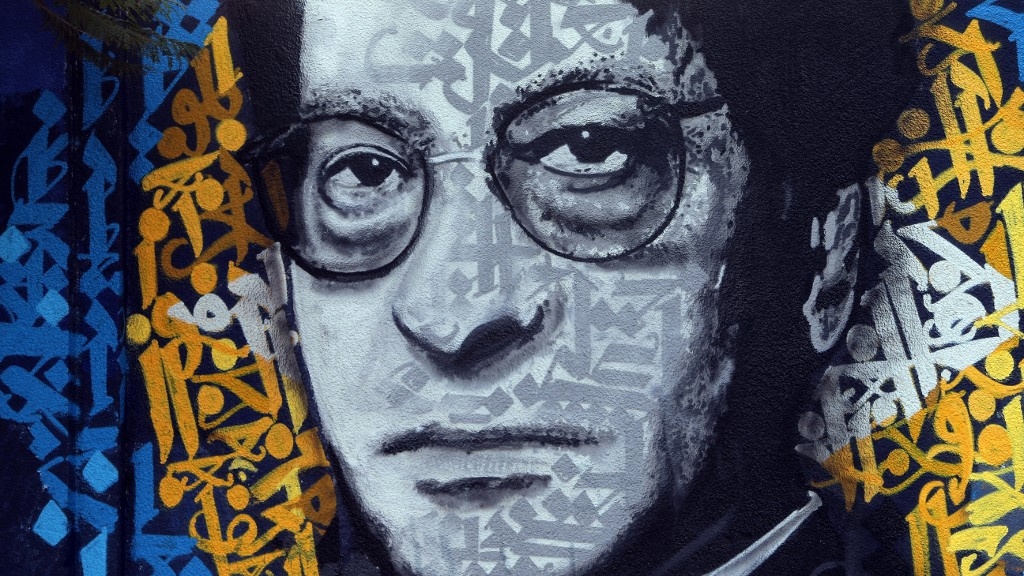
The following text talks about embracing Palestine through poetic language, which can bring to the fore what is often considered “unspeakable”, forcing us to invest in the labour of deciphering and understanding.
Poets describe how people interact, fail each other, and embrace each other.
There are deadly embraces: ones that smother, obfuscate, and annihilate - yet they cannot erase Palestine. There are also unintended embraces: ones that haunt, but mutually entangle both parties.
Lastly, there are friendly embraces: warm and comforting, yet faraway, and unable to offer protection from Israel’s ongoing process of dehumanisation.
Israel’s embraces are flattening and silencing, aiming to transform the territory and dissolve Palestine. They are not only physical, robbing people of their land through overwhelming force and genocidal violence, alongside decades of unmaking, destruction, and displacement in the name of redemption, civilisation, and “self-defence”.
New MEE newsletter: Jerusalem Dispatch
Sign up to get the latest insights and analysis on Israel-Palestine, alongside Turkey Unpacked and other MEE newsletters
They also aim to rob people of their memories and their voices, dehumanising and exhausting Palestinian sumud (resilience), and ultimately creating a category of “superfluous people”, in the words of philosopher Hannah Arendt.
There are also less tangible, but still strongly damaging embraces, resulting from collaboration and overlapping interests. The result is more silencing, preventing Palestinians from telling their stories and reclaiming their rights. Mahmoud Darwish decided to become the poet of Troy “because Troy did not tell its story”.
'You will stay when we stay'
The concealment of crimes, evidence, and narratives cannot be attributed solely to Israel. Both its allies and silent bystanders have actively participated in sustaining the cruel embrace in which Palestine is trapped.
In Questions the media should ask the people of Gaza, Palestinian poet Samah Sabawi denounces how the media has contributed to the erasure of crimes.
Follow Middle East Eye's live coverage of the Israel-Palestine war
“How do you bury your dead when you’re still running for cover?” she writes. “How do you shelter from the bombs when they follow you like your shadow? How do you dig through rubble in worn sandals and bare calloused hands? How do you put together all the pieces of your loved ones? Do you start with the head or the toe? And do you always know where all the pieces go?”
Palestinian American poet Fady Joudah poignantly writes about Israel’s attempts at making Palestine disappear in his new collection, a poetic response to the latest war on Gaza:
“You will be when we be. You will stay when we stay.
You have made our tears yours, your memory
no longer possible without us.
Despite a plentitude of attempts to undo Palestine and transform the territory, Palestine is holding on
"You will need our sky for yours to hold up,
and our sea waves to teach you return.
"We will return
though not
as you have.
"Say you’re sorry. Will you
say sorry once? How long before your first remorse?
"We absolve you of reparation, promise you forgiveness.
How long before you enter us to leave yourself?”
Palestinians will remain in place and continue to haunt Israel, as long as it keeps them locked in this mutually destructive embrace. As Palestinian poet Tawfiq Zayyad wrote: “Remaining we are / In your throats / Like a piece of glass, like cactus.”
'We are each other's harvest'
Despite a plentitude of attempts to undo Palestine and transform the territory, Palestine is holding on. Poets such as Joudah and Zayyad point to the impossibility of building a future on the graveyard of another nation.
The third type of embrace is that of caring bystanders - of people who recognise vulnerability and precarity, and acknowledge our profound dependency on others. They are willing to jump in to try to improve Palestinians’ lives by demonstrating, occupying, boycotting, pleading, marching, singing, advocating, mourning, writing, and mobilising.
They are sensitive to different ways of imagining and inhabiting worlds of possible experiences. They recognise the depth of the Palestinian experience, the pain of not being able to tell your story, the weight of unrecorded voices.
They also understand the disastrous impacts of epistemic violence directed at Palestinian knowledge and culture, and the necessity of resisting injustices. Still, they cannot stop the violence or prevent “the earth from closing” on Palestinians, to use Darwish’s analogy.
Surely, these bystanders are not solely a force for good; they can eclipse Palestinian voices, be blinded, or err. But at the same time, they work to prevent wrongs from being unrecognised, glossed over, distorted, or forgotten. They strive to co-create avenues for justice and accountability.
As American poet Gwendolyn Brooks noted: “We are each other’s harvest: we are each other’s business: we are each other’s magnitude and bond."
Palestinians’ isolation and exile from the “rules-based order” is not a given; we must all inhabit this world together.
This third type of embrace pushes back against feelings of powerlessness, when history seems particularly bleak, in an attempt to transform and restore humanity.
The views expressed in this article belong to the author and do not necessarily reflect the editorial policy of Middle East Eye.
Middle East Eye delivers independent and unrivalled coverage and analysis of the Middle East, North Africa and beyond. To learn more about republishing this content and the associated fees, please fill out this form. More about MEE can be found here.



